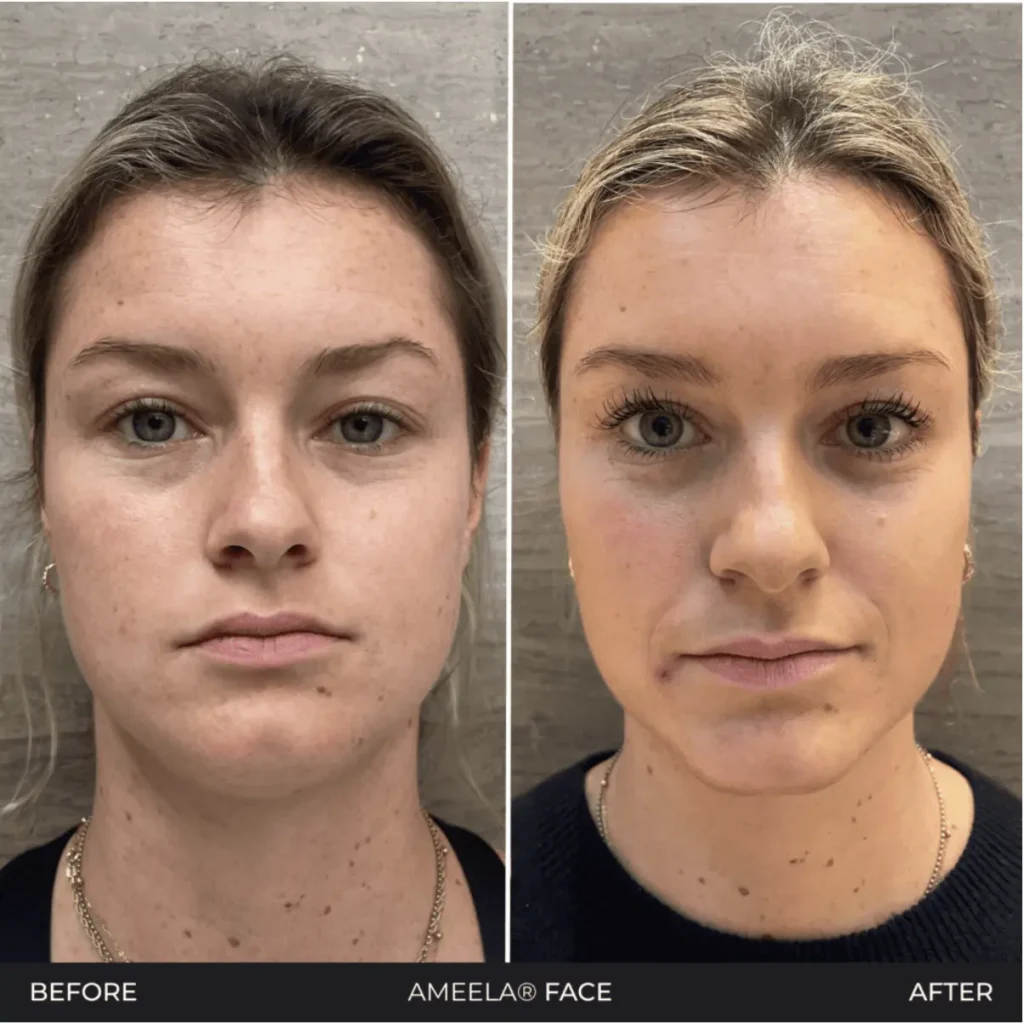Curious about how polynucleotides work to rejuvenate the skin and the advantages of incorporating aesthetic treatments with polynucleotides?
In the ever-evolving world of aesthetic medicine, polynucleotide injections have emerged as a groundbreaking injectable treatment in skincare, garnering increasing attention from both aesthetic practitioners and beauty enthusiasts. These powerful molecules are transforming the landscape of skincare technology, promising remarkable improvements in skin quality and rejuvenation. This article explores the science behind polynucleotides, their benefits, and their potential to revolutionise aesthetic medicine.
What are Polynucleotides?
Polynucleotides are long chains of nucleotides, which are the fundamental units of DNA and RNA. They play critical roles in storing and transmitting genetic information in biological systems. There are two main types of nucleotides: DNA (deoxyribonucleic acid) and RNA (ribonucleic acid).
DNA: DNA is the molecule that stores genetic information in living organisms.
RNA: RNA plays a crucial role in using the genetic information encoded in DNA to produce proteins. RNA molecules are involved in various cellular processes, including acting as a messenger between DNA and ribosomes, where proteins are synthesised.
From an aesthetic point of view, they play a crucial role in various biological processes, especially cellular skin repair and skin regeneration. Originally, polynucleotides were utilised in medical therapies for their regenerative properties, particularly in wound healing and tissue repair.
Have You Heard of The Latest News: Salmon Sperm Facial?
These DNA polynucleotides extracted from the salmon gonads were distilled, purified and mixed into a water formula, before injection used in aesthetic medicine. It can be used on the face, neck, and hands, but its most popular use is under the eyes to target concerns like dark circles and tired-looking skin.
These nucleotides undergo rigorous processing to ensure safety and effectiveness, with biotechnological advancements enabling the consistent synthesis of high-quality polynucleotides for anti-ageing treatments.
Popular in Korea and even tried by celebrity Jennifer Aniston, salmon sperm facials are favoured for their high purity and biocompatibility. These DNA polynucleotides act as biostimulants, promoting the activity of fibroblast cells in the skin, which boosts collagen and elastin production. Distinct from traditional fillers, this advanced skincare technology aims to rejuvenate the skin by improving texture and elasticity, reducing fine lines, and brightening the complexion.
Mechanism of Polynucleotide Action in Skincare
As mentioned briefly earlier, polynucleotides stimulate fibroblast activity, promoting collagen and elastin production, essential for skin firmness and elasticity. They enhance cellular repair mechanisms, accelerating the healing of damaged skin tissues.
Beyond that are the significant anti-inflammatory effects, reducing redness, swelling, and irritation. These properties make them ideal for post-treatment care, minimising downtime and enhancing patient comfort.
Another ability of polynucleotides is their ability to improve skin hydration by enhancing the extracellular matrix (ECM), which retains moisture and provides structural support. Increased skin elasticity results in a more youthful and supple appearance.
Polynucleotides also help neutralise free radicals, reducing oxidative stress and preventing premature ageing. This antioxidant action protects the skin from environmental damage and promotes long-term skin health.
Benefits of Polynucleotides in Aesthetic Treatments
Think polynucleotides, think smoother skin, reduced fine lines and wrinkles, and brighter under-eyes. They are widely used for tackling dark circles, improving overall skin quality, and stimulating regeneration in more challenging areas such as acne scars or stretch marks.
Polynucleotides can be used in various treatment modalities, including injectables, serums, and topical applications. They are suitable for facial rejuvenation, scar treatment, and even hair restoration.
These are injected very superficially into your skin either by creating small blebs on the skin’s surface using tiny needles or a cannula to distribute the product evenly. Polynucleotide injections rarely cause any lumps, bumps, or overfilling as compared to dermal fillers.
Moreover, polynucleotides are often favoured for certain areas like under the eye and neck as it does not cause water retention like hyaluronic acid. Primarily, dermal fillers exert their effect by a physical volumising effect that is instant. As hyaluronic acid attracts and holds onto water, it may be unsuitable for some areas which are prone to puffiness. Because of this, a combination approach of polynucleotides and dermal fillers will have holistic effects.
How are Hyaluronic Acid (HA) Skin Boosters Different from Polynucleotides?
Skin boosters combine hyaluronic acid with amino acids, hydrating agents, or antioxidants. They provide an instant gentle lifting effect and hydration. The hyaluronic acid attracts water, offering a mild plumping effect that helps reduce fine lines and gives your skin a healthy glow. However, the effects are short-term since there’s no regeneration involved.
Polynucleotides, on the other hand, work differently. They boost fibroblast production, initiate tissue repair, regulate pigmentation, reduce inflammation and oxidative stress, and promote hydration. Unlike skin boosters, they don’t volumise or produce instant results. Instead, they work at the cellular level, making them the only injectables with this capability.
Integrating Ameela® Polynucleotides into Aesthetic Practice
Aesthetic practitioners should seek comprehensive and product-specialised training in polynucleotide treatments to ensure proper technique and safety.
Workshops and certification courses can provide hands-on experience and detailed knowledge about the latest advancements in polynucleotide technology. Choosing high-quality polynucleotide products from reputable manufacturers is crucial to ensure consistency and efficacy. Aesthetic practitioners should look for products with proven clinical results and minimal risk of adverse reactions.
Polynucleotides are fantastic for skin regeneration on their own and are also invaluable as a pre-treatment for other procedures like lasers, microneedling, or surgery. When combined with other injectables, they stimulate your skin in the most natural way.
Educating patients on the benefits and potential outcomes of polynucleotide treatments is essential to set realistic expectations. Marketing these treatments effectively can attract a broader client base interested in innovative and effective skincare solutions.
Book Polynucleotides Training Course Now (London and Newcastle)
Here’s a sneak peek of the before and after results with the pioneering Polynucleotide brand Ameela® in the Acquisition Aesthetics Polynucleotides Training Course.

Future Trends in Polynucleotide Use
The future of polynucleotides in aesthetic medicine looks promising, with ongoing research into new applications and advancements. Future trends may include the development of more targeted polynucleotide treatments that address specific skin concerns with greater precision. Innovations such as using polynucleotide-rich serums, masks, and creams have already started gaining popularity among consumers looking for high-performance products that deliver visible results.
As the understanding of polynucleotide technology deepens, we may see their use expanding into other areas of medicine and wellness, further solidifying their role in skin health and rejuvenation. This may include facial erythema, vulvovaginal atrophy, iatrogenic fat atrophy, cutaneous ulcers, etc.
Polynucleotides FAQs
How many sessions of polynucleotide treatments are needed?
Typically, polynucleotide treatments involve a series of sessions, with results becoming more noticeable over time. You’ll be able to see improvements in 2-3 weeks time, but the full effect is only visible at approximately 3 months onwards.
What is the cost of one polynucleotide treatment?
The cost of treatments can vary depending on the type and extent of the procedure, but many patients find the investment worthwhile for the long-term benefits. In the UK, it is estimated to cost around £400 – £1000/injection, depending on the treatment area.
Are there any side effects related to polynucleotides?
Side effects are generally minimal, with temporary redness or swelling being the most common. Patients can expect improved skin texture, reduced wrinkles, and enhanced firmness, making polynucleotide treatments a popular choice for those seeking non-surgical skin rejuvenation options.
Conclusion
Polynucleotides represent a significant skincare technology advancement in the field of aesthetic medicine, offering innovative solutions for skin rejuvenation and health.
Their ability to stimulate cell growth, repair tissue, improve skin quality, reduce inflammation, and even help minimise stretch marks makes them a valuable tool for all aesthetic practitioners. As research and technology continue to evolve, polynucleotide injections are poised to play an even more prominent role in aesthetic treatments.
At Acquisition Aesthetics, we offer the pioneering Polynucleotide brand Ameela® in the Acquisition Aesthetics Polynucleotides Training Course. Our Polynucleotides Training Programme begins with a deep dive into the theoretical aspects of this groundbreaking solution coupled with hands-on practical training.
For more information about Acquisition Aesthetics and to register for other injectable courses, visit the Acquisition Aesthetics website today. Your future in aesthetics starts here!
Call: 0203 514 8757
Email: contact@acquisitionaesthetics.co.uk.

